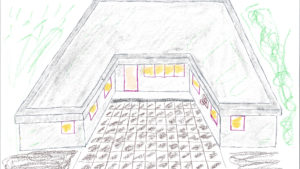In order to understand this story, I will need to tell you about my background first. I was born in Turku, Finland, but my family moved to Israel when I was three years old. We spent our first year in Israel in a Finnish village near Jerusalem, called Yad Hashmona. After that my family moved to a kibbutz in northern Israel called Merom Golan. Kibbutz’s differ from a normal village by its communist ideology: All the members of the kibbutz work for the kibbutz and for their work, the kibbutz provides them with all their needs: free housing, food, furniture, clothes, education, etc. As children, we gathered every year in the Kibbutz’s clothes department, where each one of us was allowed to pick clothes for themselves: a couple of trousers and a couple of shirts. We also got two pairs of shoes and one pair of sandals every year. Everyone ate together in the dining hall of the kibbutz, where food was free for the members of the kibbutz and their children. Once we were thirteen, we also began working for the kibbutz for one day a week. For the rest of the week we studied in the local school.
When I was a child, the kibbutz was still based on communist ideology: All the members of the Kibbutz got equal pay, no matter what job they held. Every job was equally important for the community. And the kibbutz, took care of all the members equally. For us children, this was like paradise, if we wouldn’t take into account the negative sides of the kibbutz.
Namely, we as children, had to live and sleep in the kibbutz’s kindergarten by ourselves, and not with our parents. This was really difficult for many of us, both mentally and emotionally. We lived and slept in the kindergarten, and every evening we got to see our parents for a few hours. Later on in the evening, our parents took us back to the kindergarten, where they would help us fall asleep. After that, we were left alone in the kindergarten. Once every hour or so, an armed guard would come and do his round in the kindergarten and check that everybody was OK. (The kibbutz was located near the Syrian border, so there were armed kibbutz members guarding the gates and the places were the children slept). So as children, we had to basically raise ourselves up and solve our problems by ourselves, without adult supervision. We became independent, but, as they say in Hebrew: “scratched” children.
I started going to the kibbutz’s kindergarten when I was four years old, when I didn’t even understand Hebrew yet. I remember the first night I slept in the kindergarten: I got into a fight with a Israeli boy, after which several children attacked me. Probably the whole fight was due to a misunderstanding. I just didn’t understand what they were saying, and got into a fight. And the other kids just tried to keep us apart until we calmed down. However, to me it felt like I was being attacked, first by one child and then by the rest of them. First night without mother… ☹
My little brother was also born at that same time, and since he was a baby, he got to sleep at home with my parents, and I didn’t. This seemed really unfair to me and I always felt like I did something wrong and that’s why I was punished and thrown out from my parents’ home. It wasn’t until many years later that I realized that my parents were just too insecure and didn’t have the courage to say no to the authorities of the kibbutz. They should have told the kibbutz that their children needed time to learn the language first, and only after they have learned how to communicate in Hebrew, they can be put in a kindergarten, with the rest of the children. (Today, children no longer sleep in the kibbutz’s kindergarten. The children sleep in their parents’ home until they are 16, at which point they move into a youth center, and get their own apartments). Although sleeping in the kindergarten was difficult at first, it also had a positive side: I escaped most of my father’s violence and humiliations. But I’m going ahead of myself, we will get to that part later on in the story.
When I was six, I moved to the kibbutz’s elementary school, where I continued to grow up. Each age class had its own building, where we lived and slept, two or three children in each room. In the room, each child had a bed, a night lamp and a small cabinet, where we could keep our things.
